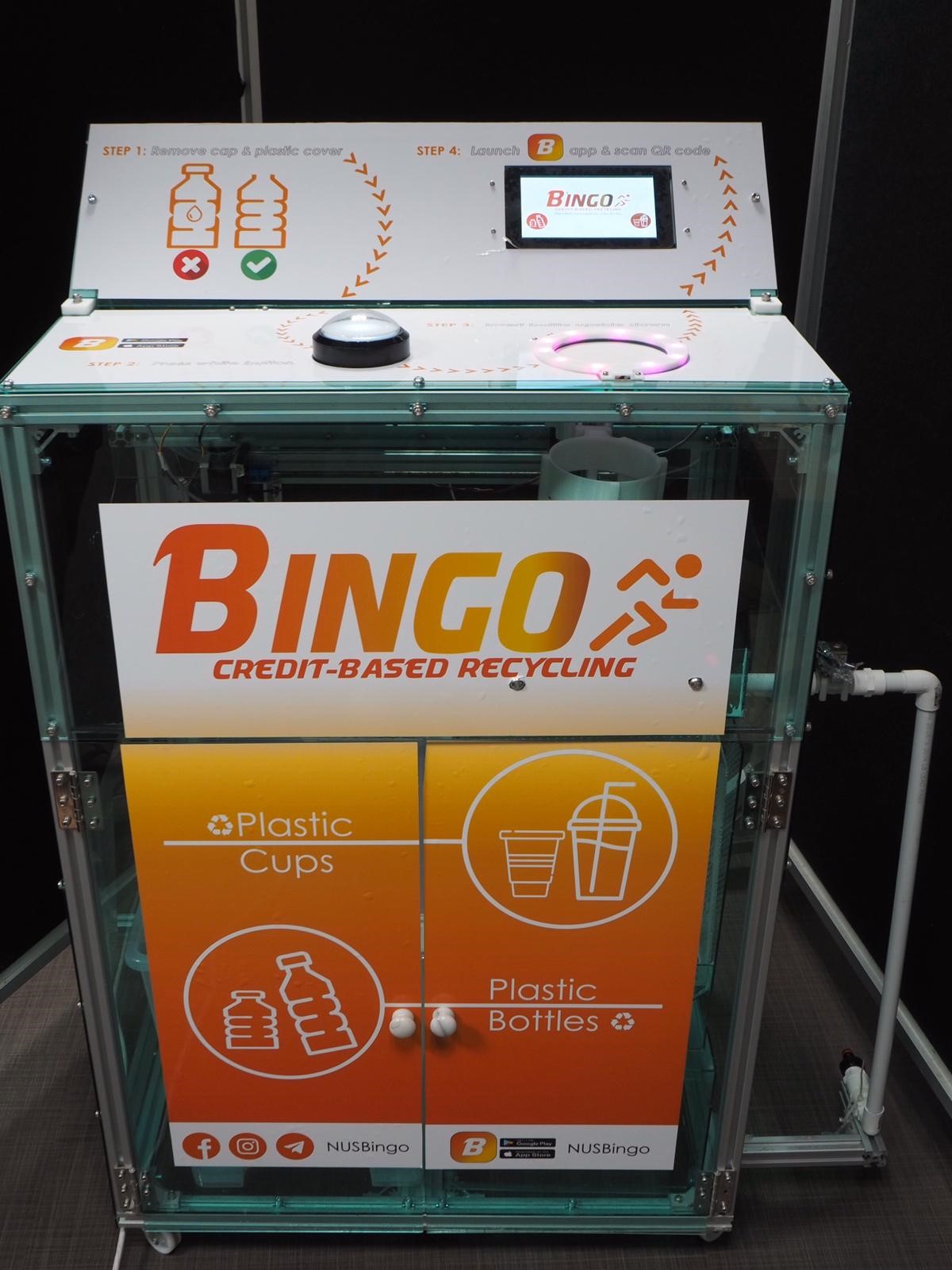BINGO: Credit-based plastic recycling for the NUS campus

Physical prototype of BINGO
Project Motivation
According to the National Environmental Agency (NEA), the plastic recycling rate in Singapore in 2018 is 4%. This is very low compared to other materials such as paper and cardboard for which the recycling rate is 56%. This phenomenon is also seen on the National University of Singapore (NUS) campus where most of the plastic waste is made up of beverage bottles and cups. In 2012, the plastic recycling rate in NUS is only 9%. This measly rate is caused by a few reasons. Firstly, based on the results from our initial survey, many members of the NUS community do not know how to recycle plastic materials properly. They are unsure about which types of plastics can be recycled and whether items must be rinsed beforehand. Secondly, they find that rinsing plastic recyclables is inconvenient which discourages them from recycling. In our survey, only 30% of respondents said that they rinse their plastic bottles and cup before dispensing into a recycling bin. Thirdly, there is a general lack of motivation to recycle rightly because there is no tangible reward for doing so. Hence, due to these reasons, over 60% of items thrown into recycling bins are considered too contaminated for recycling and hence are treated as general waste which ends up incinerators and landfills.
However, current solutions to tackle this problem of high contamination and low plastic recycling rate have been inadequate which is evident from the stagnant recycling rate over the past few years. This is because the solutions have not tackled the issues of uncertainty, inconvenience, and lack of motivation in an integrated manner. Therefore, this project aims to design a means to increase the plastic recycling rates in NUS by motivating users to recycle plastic drink containers in a manner that is more convenient and minimizes contamination.
Design
The proposed solution, BINGO, is a credit-based recycling system that is designed to distinguish plastic bottles and cups from other materials, clean the recyclables, and reward users for recycling the plastic drink containers. It comprises a smart bin that automates the classification and cleaning processes plus a mobile application that serves as a platform for users to track their recycling history and receive rewards.
A first-time user of the proposed solution would first need to download and install the BINGO application and register for an account. The user can then use the mobile application to locate the nearest BINGO bin. At the bin, the user would first need to remove and discard the cap or cover of the plastic drink container before pressing a button to activate the bin. This opens a chamber for the user to empty the contents of the container and then insert it into the bin. Thereafter, the bin will scan the container to determine whether it is an empty plastic bottle or cup. If the container is rejected, the user will be prompted to remove the item. However, if the container is accepted, the bin will wash the item and then transport it using a system of linear actuators to a storage compartment. At the same time, a QR code will be shown on a screen that the user can scan using the mobile application to receive points. The points can be accumulated and subsequently exchanged for rewards using the mobile application.
The proposed solution provides convenience for users as well as minimizes contamination of recyclables by only accepting plastic drink containers and washing them, while the incentive scheme is designed to encourage users to develop a habit of recycling. From the results of our preliminary user testing using the first prototype of the proposed solution, 73.5% of respondents mentioned that they would recycle their plastic drink containers more often if BINGO is implemented on campus. About 56% of respondents also affirmed that an incentive of up to $0.20 per five items is attractive enough to motivate them to recycle.

Project Team
Students:
- Arunima Agrawal (Mechanical Engineering, Class of 2021)
- Linde Leenmel Amores (Chemical Engineering, Class of 2022)
- Nixon Osckar (Mechanical Engineering, Class of 2021)
- Ng Terry (Environmental Engineering, Class of 2021)
- Zeno Maverick Low Wei (Electrical Engineering, Class of 2022)
Supervisors:

